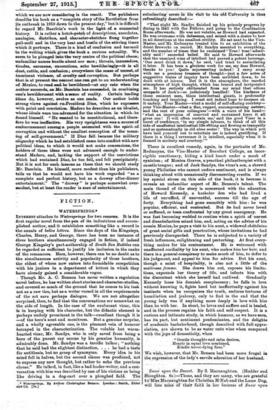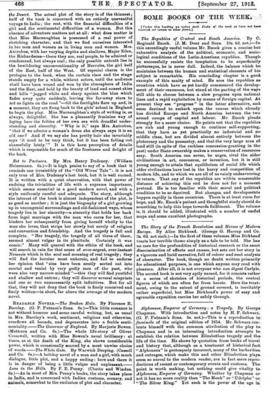Snow upon the Desert. By S. Macnaughtan. (Hodder and, Stoughton.
8s.)—Those, and they are many, who are grateful t O-Miss Macnaughtanfor Christina M`Nab and the Lame Dog, will laic hone Of 'their 'faith in her because of Snow upon fhe Desert. The actual plot of the story is of the thinnest; half of the book is concerned with an entirely uneventful voyage to India; the rest, with the financial difficulties of a, girl and the sentimental difficulties of a woman. But thie absence of adventure matters not at all: what does matter is that Miss Macnaughtan is possessed of a real power of sketching character, and that we find ourselves interested in her men and women as in living men and women. Mrs. Antrobus, with her varying depths and shallows, Major Eden, the Richardsons—there they are, real people, to be admired or condemned, but always real; the only possible untruth lies in the bewildering unconventionality of Hercules, the girl half of the East, half of the West. Of especial charm is the prologue to the book, when the curtain rises and the stage stands empty for a while, without actors, until the audience shall have been wooed and won by the atmosphere of India and the East, and held by the beauty of land and sunset skies and hills "jagged white and sharp against the blue which fades away quite suddenly, leaving the far-away stars to act as lights on the road "—till the footlights flare up and, in a. moment, they are flung back to the girls' school in Englund to begin the play. Miss Macnaughtan's style of writing is, as always, delightful. She has a pleasantly feminine way of laying bare the foibles of her own sex with dreadful under- standing and sincerity. "Why is it," says Mrs. Antrobus, " that if we admire a woman's dress she always says it is an old one ? And if we say she has pretty hair she invariably says 'it uEed to be very thick, but it has been falling out shamefully lately.'" It is this keen perception of details which is responsible for much of the freshness and delight of the book.











































 Previous page
Previous page